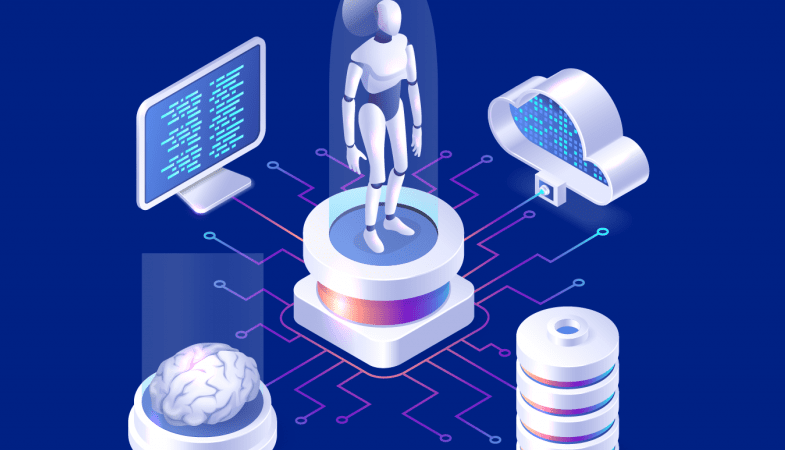The Evolution of AI in Business

AI in Business is a term that has gained immense popularity in recent years, and it’s not just confined to the realms of science fiction anymore. AI is a rapidly advancing field with real-world applications that are changing how we live, work, and interact with technology. In this article, we’ll delve into the world of AI, exploring what it is, its history, how it works, and its profound impact on various aspects of our lives.
What is Artificial Intelligence (AI)?
At its core, Artificial Intelligence refers to the development of computer systems capable of performing tasks that typically require human intelligence. These tasks encompass various activities, including problem-solving, understanding natural language, recognizing patterns, and making decisions.
AI systems can be designed to mimic human cognitive functions such as learning, reasoning, problem-solving, and perception. These systems can process vast amounts of data, analyze it, and generate actionable insights. The overarching goal of AI is to create machines that can execute tasks that would ordinarily require human intelligence and to do so efficiently and accurately.
The History of AI
The concept of artificial intelligence has been around for centuries, with the earliest traces found in Greek mythology, where mechanical beings were crafted to mimic human actions. However, AI as we know it today has its roots in the mid-20th century. The term “Artificial Intelligence” was coined by John McCarthy in 1956 when he organized the Dartmouth Conference, which marked the birth of AI as a formal field of study.
Over the decades, AI development has gone through several waves, each marked by significant advancements:
1 Symbolic AI (1950s-1980s): Early AI systems were based on symbolic reasoning and rule-based expert systems. These systems utilized human-designed knowledge bases to make inferences and decisions.
- Machine Learning (1980s-2000s): This period saw the emergence of machine learning techniques, where AI systems could learn and adapt from data. Expert systems gave way to neural networks, decision trees, and other learning algorithms.
- Big Data and Deep Learning (2000s-Present): Recent developments in AI have been fueled by the availability of massive datasets and increased computing power. Deep learning, a subset of machine learning, has led to remarkable breakthroughs in areas like computer vision and natural language processing.
How Does Work AI in Business?
AI in Business systems relies on algorithms, which are sets of rules and instructions that guide the computer’s behavior. These algorithms allow AI to process and interpret data, learn from it, and make predictions or decisions. Let’s explore some key components of AI in Business:
- Machine Learning: Machine learning is a fundamental aspect of AI. It involves training AI models on large datasets to recognize patterns and make predictions. Types of machine learning include supervised learning, unsupervised learning, and reinforcement learning.
- Neural Networks: Neural networks, inspired by the human brain, are at the core of deep learning. These networks consist of interconnected layers of nodes (neurons) that process and transform data.
- Natural Language Processing (NLP): NLP is a subfield of AI that focuses on enabling computers to understand, interpret, and generate human language. This technology is used in chatbots, translation services, and sentiment analysis.
- Computer Vision: Computer vision allows AI systems to analyze and understand visual information from images or videos. It plays a crucial role in facial recognition, autonomous vehicles, and medical image analysis.
- Reinforcement Learning: In reinforcement learning, AI agents learn by interacting with their environment. They receive rewards or punishments based on their actions, allowing them to adapt and improve their decision-making.
The Impact of AI in Business
AI in Business has transformed various aspects of our lives and continues to do so. Here are some areas where AI is making a significant impact:
- Healthcare: AI assists in early disease diagnosis, drug discovery, and the personalization of treatment plans.
- Finance: AI in Business is used for algorithmic trading, fraud detection, and customer service in the financial industry.
- E-commerce: It powers recommendation systems, dynamic pricing, and chatbots for customer support.
- Autonomous Vehicles: AI enables self-driving cars and drones to navigate and make decisions.
- Manufacturing: AI-driven robots and automation systems improve manufacturing efficiency and quality.
- Education: AI is used in personalized learning, grading, and educational content creation.
- Entertainment: AI algorithms recommend movies, music, and content tailored to individual preferences.
Challenges and Ethical Considerations
While AI in Business offers incredible potential, it also presents challenges and ethical concerns. These include issues related to data privacy, bias in algorithms, job displacement, and the responsible use of AI in military and surveillance applications. As AI becomes more integrated into our lives, addressing these concerns is of paramount importance.
Conclusion
AI in Business is a remarkable field that has the potential to revolutionize the way we live and work. It’s an exciting journey with opportunities, challenges, and ethical considerations. Understanding the basics of AI is the first step towards making informed decisions about its use and harnessing its capabilities for a better future. As AI continues to evolve, we can expect it to have an even more profound impact on our society and open up new possibilities that were once the stuff of science fiction.






